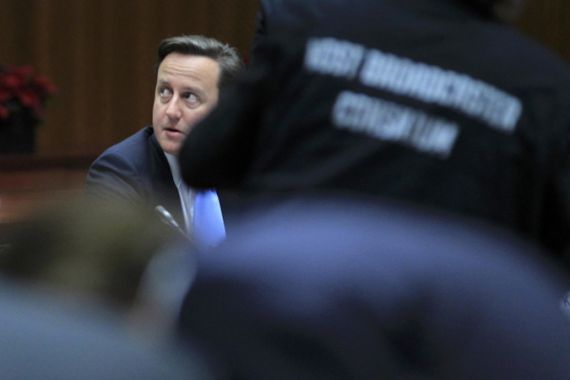Britain alone in opposing EU treaty changes
While all other 26 EU members united after marathon talks, premier Cameron argues he is protecting national interests.

The European Union has said that 26 of its 27 member countries are open to joining a new treaty tying their finances together to solve the euro crisis. Only Britain remains opposed, creating a deep rift in the union.
In marathon overnight talks, the 17 countries that use the euro gradually persuaded nearly all the others to consider joining the new treaty they would create. Some of those countries may face parliamentary opposition to the treaty, which would allow for unprecedented oversight of national budgets.
Keep reading
list of 4 itemsEcuador weighs security, international arbitration in latest referendum
‘Triple spending’: Zimbabweans bear cost of changing to new ZiG currency
Boeing hit with 32 whistleblower claims, as dead worker’s case reviewed
“Except for one, all are considering participation,” EU President Herman Van Rompuy told reporters after the summit ended. “I’m optimistic because I know it is going to be very close to 27.”
A document released near the end of a high-stakes EU summit on Friday said the leaders of nine of the 10 EU countries that don’t use the euro “indicated the possibility to take part in this process after consulting their parliaments where appropriate.”
“This is the breakthrough to the stability union,” Angela Merkel, the German chancellor told a press conference after the summit.
Britain will not be excluded from the European Union despite vetoing a treaty aimed at saving the euro, but its relationship with the bloc has changed, Prime Minister David Cameron said Friday after the summit.
“We are not being excluded, we are in the European Union, we’re a leading member of the single market,” Cameron told British broadcasters.
Diplomatic tensions
French President Nicolas Sarkozy said the 17 nations that are in the eurozone would now press ahead to approve an inter-governmental treaty among themselves, setting a March deadline.
The key item on the agenda during overnight talks was a Franco-German plan on a tighter fiscal controls with automatic penalties for eurozone nations that overspend.
Earlier, Cameron said: “What is on offer isn’t in Britain’s interests so I didn’t agree to it. Of course we want the eurozone countries to come together and to solve their problems. But we should only allow that to happen inside the European Union treaties if there are proper protections for the single market and for other key British interests. Without those safeguards, it is better not to have a treaty within a treaty but to have those countries make their arrangements separately.”
Al Jazeera’s Tim Friend reported from Brussels that while there are wide differences of opinion amongst other EU members, they are broadly united in their support for the initiative. Britain is perceived as being increasingly isolated in its position.
“Everyone is trying to be as diplomatic as possible, but when you have talks going into the early hours of the morning, strains will show,” Friend reported.
|
What the papers in Europe say about the EU fallout |
Jacky Rowland reported from the summit that the reaction to Britain’s veto was “angry, annoyed, yes, but hardly surprised”.
“All the indications all along from David Cameron were that he wasn’t going to sign anything which gave more power to Europe,” she said.
The French president’s comments that it was unfair for UK to expect exemptions from the rules, and that it was precisely the lack of adequate regulation that had led to the financial crisis, is one that many ordinary Europeans are likely to agree with, Rowland noted.
Mario Monti, Italy’s premier, regretted Britain’s decision, saying it faced “certain isolation” in the immediate future.
“Cameron made demands that were unacceptable, even to me,” Monti told reporters. “It will have an impact on its influence and this displeases me because it is good to have a counter-weight to countries like France,” he said.
Despite frustration against Cameron amongst EU negotiators, Merkel took a more conciliatory position at her press conference.
Negotiating a collective response to the eurozone crisis was a “step-by-step process which will re-establish a new basis of trust and confidence in the euro; in our common currency,” she said.
“When I say ‘we’, I include the 17 member countries of the eurozone, but we’ve also received a lot of support from those countries which have not yet joined up with the euro.”
Repeated warnings
After repeated warnings from London, the decision to change track came after Cameron demanded paybacks such as a veto on EU financial regulation that partners were not prepared to grant.
Cameron has vowed to protect the City of London, with France and Germany leading EU moves to impose a financial transactions tax which the British prime minister says would hit the UK the hardest.
The summit agreed on automatic sanctions for euro area deficit offenders unless three-quarters of states vote against the move, and approved a new fiscal rule on balanced budgets to be written into national constitutions.
After nearly 10 hours of talks running into the early hours of Friday morning, they also decided that the currency bloc’s future permanent bailout fund, the ESM, would be capped at $666bn, as Germany had insisted.
It will also not get a banking licence, which would have allowed it to draw on European central Bank (ECB) funds to increase its firepower, another move Germany objected to.